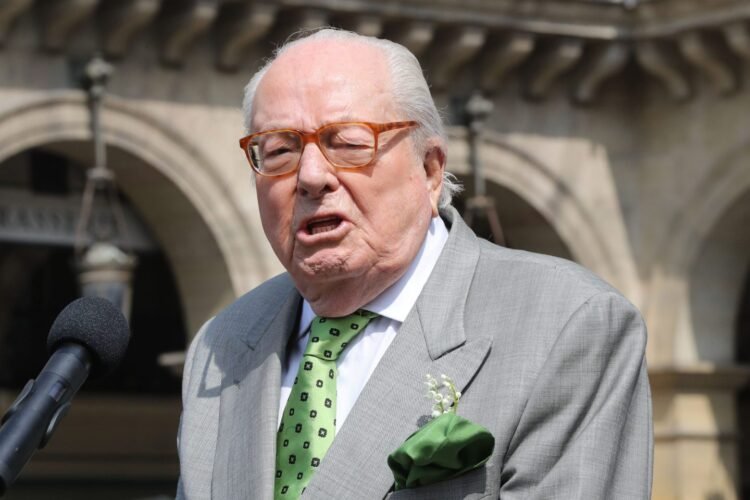Jean-Marie Le Pen, Far-Right French Leader Known for Fiery Anti-Immigration Rhetoric, Dies at 96.
PARIS – Jean-Marie Le Pen, the founder of France’s far-right National Front and a polarizing figure in French politics known for his fiery rhetoric against immigration and multiculturalism, died on Tuesday at the age of 96.
Le Pen’s controversial career spanned decades, earning him devoted followers and widespread condemnation for his nativist ideas and repeated legal troubles stemming from antisemitism, discrimination, and incitement to racial violence. Despite his convictions and eventual political isolation, the nationalist ideals he championed—embodied in slogans like “French People First”—have become increasingly influential in modern French politics and beyond.
Le Pen reached the second round of the 2002 presidential election, a stunning moment that left France and Europe reeling before Jacques Chirac defeated him in a landslide. Later, he became estranged from his daughter, Marine Le Pen, who rebranded his party, renamed it National Rally, and transformed it into a powerful political force while distancing it from her father’s extremist image.
Jordan Bardella, the current president of National Rally, confirmed Le Pen’s death on social media, calling him a “voice of the people” who “always served France.” The tribute appeared to blur the boundaries the party has tried to establish between its founder’s controversial legacy and its modernized, polished direction under Marine Le Pen.
French President Emmanuel Macron offered brief condolences, acknowledging Le Pen as “a historic figure of the far right” whose nearly 70-year political career is now “a matter for history to judge.”
A Polarizing Legacy
Born on June 20, 1928, in Brittany, Le Pen began his career as a lawmaker at the age of 27 and never strayed from his far-right roots. A former paratrooper and Foreign Legionnaire, he was deeply influenced by his experiences fighting to maintain French colonial rule in Indochina and Algeria.
In 1972, Le Pen co-founded the National Front, building it into a formidable political force by capitalizing on fears over immigration and national identity. He famously adopted Joan of Arc as the party’s patron saint and made Islam and Muslim immigrants his primary targets, blaming them for France’s economic and social challenges.
Known for his theatrical and provocative style, Le Pen shocked critics with statements that included Holocaust denial and racist denunciations of Muslims and immigrants. In 1990, he referred to Nazi gas chambers as a “detail of World War II history,” a remark he repeated in 2015, sparking outrage and legal action.
Le Pen’s rhetoric often strained his political alliances, but he defended himself as a patriot protecting the identity of “eternal France.” His combative persona, symbolized by the black eye patch he wore after losing his left eye in an accident, made him a constant force in French political life.
A Family and Political Rift
Le Pen’s relationship with his daughter Marine, whom he groomed as his political successor, soured as she sought to modernize and mainstream the party. In 2015, Marine removed him from the party and stripped him of his honorary president-for-life title after his repeated antisemitic provocations.
Marine renamed the party National Rally and moved it toward a more palatable nationalist image, culminating in her own presidential bids in 2017 and 2022, where she lost to Macron but with increasingly narrow margins. She remains a leading contender for the 2027 presidential election.
Le Pen called his removal from the party the “toughest blow” it had faced and remained defiant until the end. “I’m a moral authority for the movement, and I don’t have the habit of keeping my opinions to myself,” he declared in 2014.
Controversies and Legal Troubles
Throughout his career, Le Pen faced numerous legal battles, including convictions for incitement to racial violence, Holocaust denial, and assault. He also faced allegations of financial misconduct, along with other National Front officials, over misusing European Union funds for party-related activities.
As his health declined in recent years, Le Pen was hospitalized multiple times and placed under legal guardianship in February at his family’s request.
A Lasting Influence
Despite his controversial legacy, Le Pen’s ideas continue to resonate in French and European politics. Under Marine’s leadership, National Rally has solidified its position in the political mainstream, pushing Macron and other leaders to adopt tougher stances on immigration and security.
Le Pen is survived by his wife, Jeanne-Marie Paschos, and his three daughters. His death marks the end of an era but leaves behind a deeply divisive legacy that continues to shape France’s political landscape.

 English
English



























































